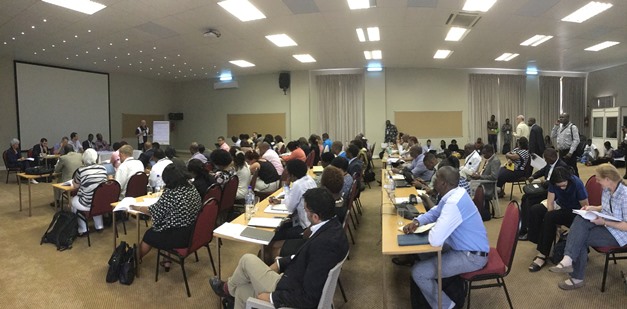Advancing the Data Revolution in AfricaSession 37 at the 7th African Population Conference Pretoria, South Africa, 1 December 2015 – 11:00-12:30
This IUSSP session aimed to stimulate discussions between demographers and data practitioners especially in regard to how to best implement the data revolution in the coming years – action plans that include “quick wins”; longer term investments and activities; setting priorities (in terms of national versus international priorities, quality versus quantity of data, priority variables, types of data, levels of disaggregation that are feasible…); avoiding potential bottlenecks, rethinking the role of international collaborations, and devising better approaches to rapidly disseminate information to policy makers, local officials and the civil society in ways they can use. The goal of this meeting was to start to generate ideas on how to tackle these issues.
The session moderator was Thomas LeGrand, vice-president of the IUSSP and professor at the Université de Montréal. The 6 panellists were:
The session was structured as a roundtable dialogue organized in a “Davos format”. After a brief introduction by Tom LeGrand, specific questions were addressed to the panelists. Each speaker was given about five minutes to respond. Afterwards, time was supposed to be left for comments and questions from the floor and responses by panelists. This format allowed for a lively and dynamic session. In a short summary article it is impossible to cover the full content of each speaker’s response, but here is a brief summary of key points made by each speaker.
Pali Lehohla insisted on the importance of national statistics offices. It is urgent to build solid statistical agencies at the national level to produce data and calculate indicators. He is concerned that the data revolution and the SDG process is driven by international political and technology interests whose priorities are not aligned with national priorities and who have not taken into account the advice and concerns of the national statistical agencies. National statisticians have a major role to play. If the objectives of the SDGs and the Data Revolution rest only in the hands of international politicians and technocrats, the outcome will not be satisfactory.
Alex Ezeh called for the development of independent and autonomous statistical and research institutions at the national level with the capacity to sustainably produce quality data. For this to occur, statistical agencies require guaranteed stable funding so that they are less vulnerable to political pressure that could result in inaccurate or biased data. This funding must come from the national level to ensure that national data priorities dominate over those of external donors. The funds must be there not only to collect data, but also to fund data analysis and encourage the sharing of data and data analysis results. Finally, more data, as required by the SDGs, is not necessarily better data. It is important to focus on the quality of data, as inaccurate data can lead to misguided policies and programmes.
Tom Moultrie responded to the issues of training and the necessity to reinforce the capacity of national statistical agencies. Distance learning may be one way to reinforce capacity. Above and beyond the production of data, it was important for analysts in the national statistical agencies to be able to judge the quality of data and assure harmonization of data. To carry this forward, it was important to develop partnerships with universities, national statistical offices and international organisations.
Rachel Snow deplored the imbalance between the large sums spent to collect data through censuses and surveys and the relatively meagre use that was made of the enormous amounts of data collected. She thought it was essential to create research centers of excellence on the African continent to analyze data locally. Unfortunately UNFPA budget austerity measures projected for 2016, meant that she was not able at the moment to make any commitments on behalf of UNFPA to aid in this effort.
Stéphane Helleringer returned to the issue of data quality and the technical challenges of determining data quality and accuracy. He noted that many of the SDG indicators required calculations at fine levels of disaggregation, which often suffer from uncertainty. It is important to include confidence intervals for such estimations; the confidence intervals will shrink as the quality of data improves. It is also important to know which data are missing to ensure the internal coherence of data, and to compare data from different sources, to improve data quality.
Patrick Gerland highlighted the importance of the denominators—the different populations at risk— used to calculate indicators. Internal and international migration and urbanization result in rapidly changing denominators, which must be regularly adjusted. He also noted that beyond the counting of vital events, such as births and deaths, a functioning civil registration system guarantees human rights. The public acknowledgement of an individual begins by the official registration of her birth.
The speakers clearly demonstrated how much the expertise of demographers is necessary if the dream of a Data Revolution is to become a true tool for development. The session provided much for the audience to consider. It was unfortunate that there was not enough time to take more questions and comments from the floor. No doubt the IUSSP will consider repeating the format at other conferences and meetings.
|
|

